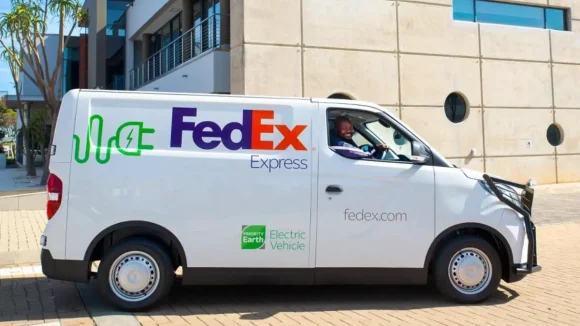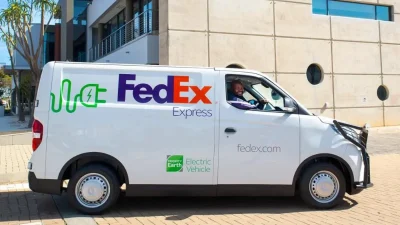FedEx Express this month initiated a trial of renewable diesel fuel to cut down on carbon emissions within its UK linehaul truck network.
This move underlines FedEx’s goal of achieving carbon-neutral operations by 2040, a plan first announced back in March 2021.
FedEx’s carbon-neutral trial
The trial involves the use of hydrotreated vegetable oil (HVO) renewable diesel to power five FedEx-owned trucks operating in the United Kingdom.
In November 2022, FedEx successfully switched to renewable diesel for long-distance vehicles in the Netherlands, marking the UK as the next test region for this environmentally-friendlier fuel alternative.
Reducing emissions in the heavyweight transport sector poses additional challenges since it is harder to cut emissions than it is in last-mile delivery.
And even though FedEx Express plans to transition to a fully electric fleet by 2040, the company faces a steep challenge with finding suitable energy alternatives.
The challenge with replacing diesel
So, what’s the big deal with replacing diesel? For starters, trucks and other larger vehicles cover extensive distances.
According to the Boston Consulting Group (BCG), trucks in the mining and agriculture sectors also make up a larger share of the industries’ environmental footprint.
Unfortunately, diesel is hard to replace since “it’s cheap, energy-dense, and readily available through established infrastructure,” BCG reports.
“Because it is relied on across so many industries, diesel combustion represents a huge share of overall emissions, comprising up to 40% of all CO2 emissions for mining and 35% for agriculture.”
That said, BCG’s research showed that while it’s not easy to find a green alternative, it is possible – several alternatives are already available while others are currently under development.
FedEx’s provisional remedy
According to Louise Whitehouse, managing director of fleet maintenance at FedEx Express Europe, switching to synthetically-made diesel could reduce ‘well-to-wheel’ carbon emissions by 80-90% per litre.
‘Well-to-wheel’ refers to the entire lifecycle of fuel, from its source to powering a vehicle.
In the case of synthetically-made diesel, the well-to-wheel cycle spans from the creation of the fuel, all the way through to its combustion in a vehicle’s engine.
ALSO READ: FedEx consolidation is on track for next year
As the industry awaits further technological advancements to fully transition away from fossil fuels, Whitehouse said using renewable diesel can already significantly reduce carbon emissions in the linehaul truck network.
Meanwhile, FedEx Corp chairman and CEO Frederick W. Smith said the company has “a responsibility to take bold action in addressing climate challenges”.
Beacon for global sustainability standards
FedEx’s goal for carbon-neutral operations covers all its transportation offerings, including parcel delivery, European trucks, and aircraft.
By testing diesel alternatives, FedEx is leading the way in finding accessible solutions to reduce carbon emissions across transportation sectors.
This initiative shows FedEx’s commitment to meeting global sustainability standards and encouraging a wider shift toward environmental responsibility.
Benefits of adopting carbon neutral goals
Fleet operators may be under pressure to adopt greener practices, but according to Mckinsey & Company, “the potential cost advantages of fleet decarbonization presents real opportunities for the sector.”
Some of these benefits include battery power becoming more efficient as charging velocity increases, as well as reducing vehicle operating costs.
And while transitioning to a greener fleet would require retraining and operational adjustments, it also presents an opportunity to modernize workflows, attract tech-savvy talent, and integrate eco-friendly practices.
This will, in the long run, streamline operations and contribute to a sustainable business model.
About the author
Cheryl has contributed to various international publications, with a fervor for data and technology. She explores the intersection of emerging tech trends with logistics, focusing on how digital innovations are reshaping industries on a global scale. When she's not dissecting the latest developments in AI-driven innovation and digital solutions, Cheryl can be found gaming, kickboxing, or navigating the novel niches of consumer gadgetry.











